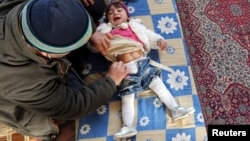GENEVA —
The World Health Organization reports the health situation in Syria has progressively worsened over the last six months. And, a WHO representative in Syria says there has been a marked deterioration in the ability to provide health care to the civilian population over the past month.
The World Health Organization representative in Syria, Elizabeth Hoff, says it is difficult to provide health care to people on the move.
Speaking to journalists in Geneva by telephone from Damascus, Hoff says Agra, a town outside Damascus, has been hosting some 200,000 displaced people.
But many of them are now are on the move again because of heavy fighting and bombardment in the town. Hoff says this constant displacement nationwide makes it difficult - if not impossible - to carry out vaccination campaigns and other health programs.
She estimates about 50 percent of the hospitals in Syria are damaged and one-third are out of service. She says most of the ambulances are damaged and those that are functional are being used for military purposes. Hoff says medicines and medical equipment are in short supply.
“What I would also say is that I went recently to the burn hospital, this is just here in Damascus where they have referrals from all over the country. And, there are an enormous amount of patients now. So, they had to open a new section because burns are affecting the civil population," she explained. "It is actually the fact that these explosions are taking place and hitting into highly populated areas. And, you see a number of children and women with serious burns.”
Hoff says the breakdown of water and sanitation is a major concern and is leading to an increase of water-borne diseases. She says hospitals are unable to operate dialysis and other medical machinery because of severe cuts to electricity and fuel.
The United Nations sanctions on the Syrian government and its leaders do not include an embargo on humanitarian goods, on medicine, or on medical equipment. Nevertheless, Hoff says the sanctions are seriously affecting the ability of WHO to import medical supplies.
“Syria cannot send money abroad to procure the medicines that they need. WHO is trying to assist in this, but it is a complicated matter," said Huff. "The Syrian government has $2.5 million available to buy new blood safety tests. We have not been able, as yet, to transfer the money to be able to procure on behalf of the Syrian government this important test to make sure that the transfusions can be given free of HIV, free of hepatitis B and C.”
Hoff says $100 million worth of medicine is needed in Syria over the next few months.
The World Health Organization representative in Syria, Elizabeth Hoff, says it is difficult to provide health care to people on the move.
Speaking to journalists in Geneva by telephone from Damascus, Hoff says Agra, a town outside Damascus, has been hosting some 200,000 displaced people.
But many of them are now are on the move again because of heavy fighting and bombardment in the town. Hoff says this constant displacement nationwide makes it difficult - if not impossible - to carry out vaccination campaigns and other health programs.
She estimates about 50 percent of the hospitals in Syria are damaged and one-third are out of service. She says most of the ambulances are damaged and those that are functional are being used for military purposes. Hoff says medicines and medical equipment are in short supply.
“What I would also say is that I went recently to the burn hospital, this is just here in Damascus where they have referrals from all over the country. And, there are an enormous amount of patients now. So, they had to open a new section because burns are affecting the civil population," she explained. "It is actually the fact that these explosions are taking place and hitting into highly populated areas. And, you see a number of children and women with serious burns.”
Hoff says the breakdown of water and sanitation is a major concern and is leading to an increase of water-borne diseases. She says hospitals are unable to operate dialysis and other medical machinery because of severe cuts to electricity and fuel.
The United Nations sanctions on the Syrian government and its leaders do not include an embargo on humanitarian goods, on medicine, or on medical equipment. Nevertheless, Hoff says the sanctions are seriously affecting the ability of WHO to import medical supplies.
“Syria cannot send money abroad to procure the medicines that they need. WHO is trying to assist in this, but it is a complicated matter," said Huff. "The Syrian government has $2.5 million available to buy new blood safety tests. We have not been able, as yet, to transfer the money to be able to procure on behalf of the Syrian government this important test to make sure that the transfusions can be given free of HIV, free of hepatitis B and C.”
Hoff says $100 million worth of medicine is needed in Syria over the next few months.




